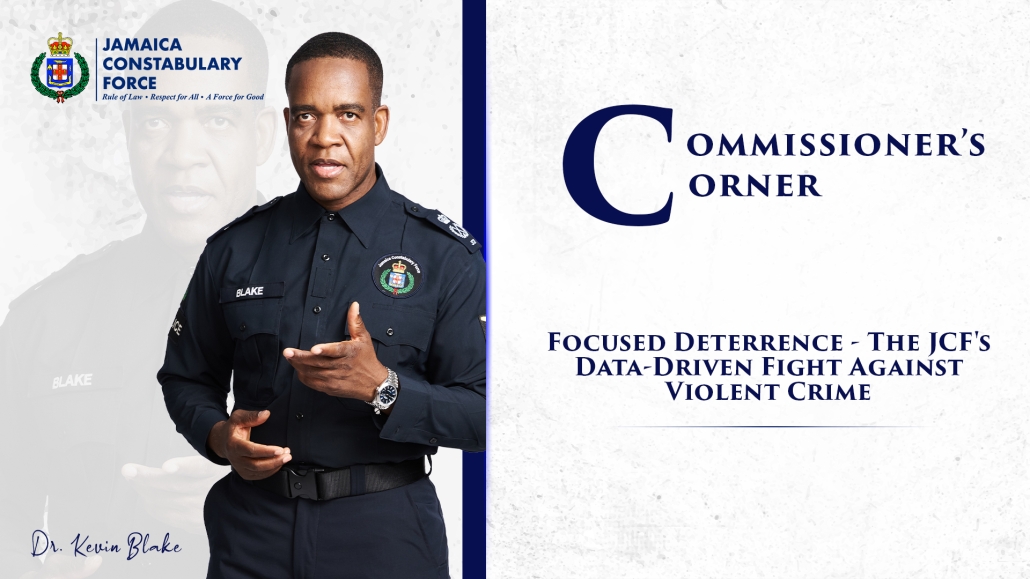
Focused Deterrence – The JCF’s Data-Driven Fight Against Violent Crime
If you’re wondering whether the Jamaica Constabulary Force (JCF) has a crime strategy that is working, let’s begin with this: murder is down by 35 percent. That’s not a statistical fluke, nor the result of good fortune. It’s the product of a focused, data-driven strategy that targets the country’s “high-risk individuals” who are responsible for a disproportionate share of our nation’s violence.
In his latest column in the Force Orders, Dr Blake reaffirmed what many close observers of the JCF already know: the organisation is not fighting crime with blunt instruments. It is using precision tools. “Among these many things is the focused deterrence strategy that we have skilfully adapted,” he wrote. It’s not mere police jargon. It’s a methodology that draws from proven models used in cities like Boston, where the Boston Gun Project in the 1990s showed that targeted policing of violence producers can yield major reductions in homicide. Jamaica is now adapting that principle to our own context; with measurable success.
What is focused deterrence? At its core, it is a strategy that homes in on the small number of individuals or groups responsible for the majority of serious crimes. These are not your typical offenders; they are repeat actors, often embedded in networks of organised violence. By targeting these individuals directly and consistently, and by combining enforcement with community and social service options, the JCF is sending a powerful message: the status quo of impunity is over.
Dr Blake explains the theoretical framework behind the approach: “The focused deterrence strategy is a data-driven and intelligence-based approach that targets specific individuals or groups responsible for a disproportionate amount of crime.” He points to the relevance of Deterrence Theory and Rational Choice Theory, both of which assume that people make calculated decisions based on potential risks and rewards. “As long as the consequences do not outweigh the perceived rewards, then they will continue to kill and maim,” he wrote in an earlier column.
That calculus is now being disrupted. The JCF has taken aim at these violence producers and is hitting them where it hurts—not only through arrests, but through disruption of their operations, financial networks, and public support. “These high risk individuals have our undivided attention,” Dr Blake declared. “They have now become our focus, as we seek to deter others from entering, and continuing, a life of crime.”
This is not some theoretical experiment. It is already bearing fruit. Alongside the sharp drop in homicides, overall major crimes are down by 18 percent. This is a clear sign that focused deterrence is both catching criminals and changing behaviour. And that is the ultimate goal of any modern crime strategy: not merely to punish, but to prevent.
Of course, a strategy like this cannot exist in isolation. It requires a network of cooperation within law enforcement and across other pillars of the criminal justice system. “This… requires the support of all the players in the security ecosystem – including the judiciary, media and the various oversight groups,” Dr Blake notes. And here’s the important nuance: while the Commissioner welcomes oversight and scrutiny, he also calls for it to be fair and responsible. “Credible and responsible oversight is very important, and should be welcomed,” he says. “But I will re-emphasize that oversight MUST be credible and responsible.”
In other words, while the JCF opens itself to evaluation, it will not accept mischaracterisations or ideological critiques untethered from the realities of day-to-day policing. There is a moral clarity in the Force’s posture right now—an understanding that it must be strategic, but also resolute.
There’s another layer to this. Focused deterrence is not just about catching the ‘bad guys.’ It’s about shifting the environment in which violence thrives. “For too long these extremely violent, high risk criminals have been masking themselves in the noise and chaos made by an environment of criminal sympathizers… and light consequences to counter the heavy rewards of their criminal deeds,” Dr Blake reflected. The goal now is to create a different environment—one where criminality has real consequences, and where law enforcement is relentless, not random.
We should be clear: this is not a call for excessive force or draconian policing. Quite the opposite. Focused deterrence, when properly applied, is about minimising the use of force by maximising the clarity of consequences. It is targeted, not indiscriminate. It is specific, not sweeping. And it is guided not by instinct, but by data.
There are few things more consequential for a developing society than reducing violent crime. It unlocks economic opportunity, social cohesion, and public confidence. What the JCF is doing right now is giving Jamaica a fighting chance—not just to police crime, but to outsmart it.
We still have a long way to go. The criminal landscape is adaptive, and the pressure on police officers remains immense. But the current trajectory is promising. The numbers are telling us something we haven’t heard in a while: we are winning. That success is not accidental. It’s strategic. It’s deliberate. And most of all, it’s focused. Because when you go after the violence producers—and mean it—everything else begins to change.







